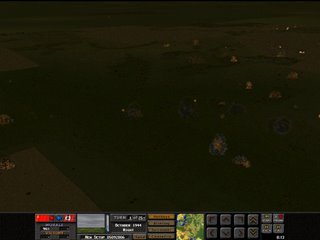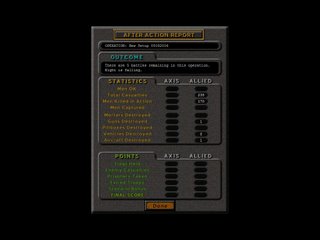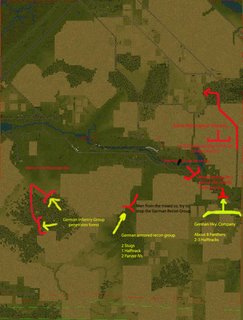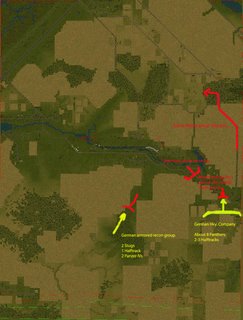The Dubno Operation
Friday, October 06, 2006
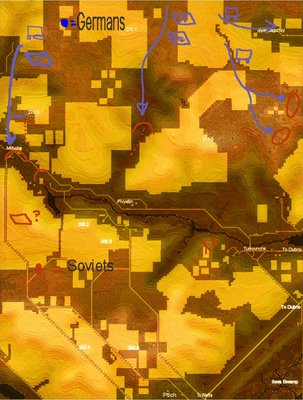
The Second battle - A German Perspective
It was planned to have three attacks of which one (headed by the Panther Battalion) would be the schwerpunkt, the others with limited objectives. This attack was to go in on the (German)right flank and take the village of Milbcha and it's bridge over the river. The middle attack, led by the mixed panzer battalion (Panzer IVH and Stugs) supported by pioneers was to simply advance to the start of the shallow balka and set-up a blocking position. On the (German)left flank the grenadier kampfgruppe was tasked with clearing the woods and hamlets on that flank of any Soviet stay-behinds.
Shortly after the units moved off an unidentified aircraft was spotted heading into the battle zone. It was identified as a Henschel ground attack aircraft, but then to the surprise and dismay of the attacking Panther battalion and it's supporting SPW the aircraft started to make an attack run. The accompanying flak vehicles engaged the hostile aircraft. As it flew low it was unidentified as a Romanian aircraft. It made several bombing runs but was then hit and brought down by a 'Wirbelwind' flak unit. No casualties were sustained in this attack.
Shortly after this air attack, contact was made with enemy tank units about 1km south of Milbcha and brought under fire from the Panther battalion. A fierce tank battle ensued with casualties on both sides. The Panther battalion claimed the destruction of four T34s and two Shermans in this action, for the loss of three of their own.
The supporting grenadiers ably supported the Panthers in fighting around the village of Milbcha, which the Soviets defended with infantry and PAK (one PAK ambushed two panthers KOing them).
On the left flank fierce close combat fighting broke out between the grenadiers and strong Soviet SMG units. this fighting was particularly violent and the grenadiers suffered heavy casualties in the close range fighting.
In the centre the Panzers and assault guns came under heavy and accurate fire from Soviet armour nearly two kilometers away and lost nearly six vehicles. The survivors manged to gain the shelter of a shallow balka and continued on their mission. They ably supported the pioneers in blocking an attack by a Soviet rifle company. The rifle company was destroyed but in the process the pioneers suffered nearly 50% casualties.
As night fell the units pulled back to their start lines. The casualty report for the day is as follows:
263 casualties
235 KIA
5 mortars lost
11 AFVs KOd
Thursday, October 05, 2006
From Russia with Katyusha...
At a pre-arranged time, entire artillery of the 43rd and the attached artillery brigade roars into action.
All along the line flashes create a false dawn to a night that will never end for some of the men on both sides of the river.
The Night Terrors
The third battle of Dubno will fought in total darkness with less than 50 meters of visibility. It is quite apparent that this is a totally unsuitable weather for the deployment of mechanized arm. I have made sure that the forward positions are manned but I have left substantial amounts of forces in the rear areas as much as possible to be proof against attempts by McEwan to breach my line of defense. ( NB. Ironically, same problem was experienced by Rommel for the defense of the Atlantic wall, if one locates his reserves too close to the line he maybe outmaneouvred, if they are too far, they wont be able to act fast enough )
It brings pleasure to me to say that we have received several of the new heavy tanks destroyers as well the remainder of the Romanian assault gun company armed with the German 75L48 gun. Also arriving tonight the mountain infantry bn which will bring our total number of infantry forces to a number of well ... the wall have ears ....
But all in all, I am really worried about this night battle with an enemy like McEwan, u can never know where and where he will appear.
I am sure that the Germans will feel the full strength of our forces once the battle starts.
Colonel Ozgurnikov
43rd Guards Infantry Division
The Second Battle of Dubno : A Soviet Perspective
The second battle of Dubno started with a 21st century style tank fire exchange. Ozgurnikov's T34's and TD company engaged the Stug. and Panzer IVs of McEwan at ranges of 2000 meters. The exchange ended with 4 Stugs out of action and a further Panzer IVs were destroyed or abondoned. In response to this unfair exchange, the German heavy Armor company advanced under the fire of 1st Hvy. TD detachment. Again the ranges were above 1000 meters. The Panther group came as far as the village but stopped at the border having come under concentrated fire of 1st Naval Bn and its supporting A/T gun platoon. McEwan lost 4 Panther G's to Ozgurnikov's 6 T34s. The mountain bn. attached to the 1.Nav.Bn also helped to fend off the German grenadiers supporting the attack. True to the style of McEwan the armor attacked with the elan of Napoleonic cavalry.
In the mean time the artillery brigade attached to the division fired 4 volleys of heavy rocket and mortar rounds into the German left flank. No results were observed but it is believed that there was some infantry concentration in the area so it is quite possible that there were some casualties. Soviet forces also used their overwhelming artillery superiority to cover the retreat of their medium tank company by firing repeated volleys of smoke.
Most saddening loss was the destruction of 2 of the pet Sherman platoon , much loved by Ozgurnikov himself. He is claimed to have said , 'they will pay for this ! , I will grease the tracks of my tanks with their intestines. '
1st Co. 2nd Naval infantry bn. penetrated the German line of advance and outflanked the Panther company's advance. In the meantime second company moved through the central valley (nicknamed 'the subway') but met with the advancing German armored thrust.Having lost men to German armor and powerless to stop it without any A/T weapons the company retreated.
This battle was particularly bloody for the Soviet cause as they have 278 KIA out of about 350+ casualties. Ozgurnikov however, voiced that as long as the Germans came in the same old way, they would be able to beat them in the same old way.
